
From the first year of school to the last, it's important to help your kids prepare for a productive and successful academic year — and that involves tackling some health-related to-dos before they head back to the classroom.
This back-to-school checklist provides health tips to help kids thrive in and out of the classroom. Start the school year strong with routines supporting physical and mental wellness.
1. Schedule a Wellness Checkup
Before the first bell rings, schedule an exam with your child’s pediatrician to monitor their health, growth and development, including scheduling any vaccinations.
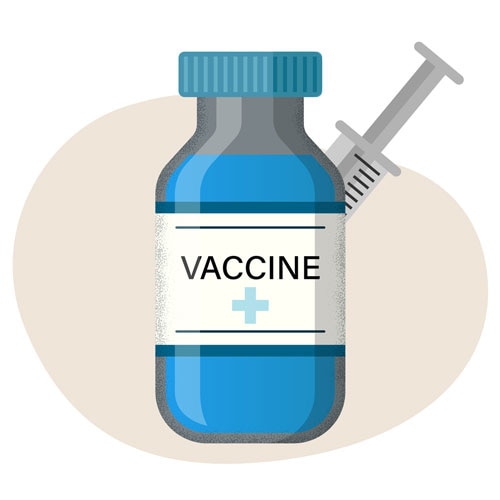
To help ensure your children are ready for school, contact their school to find out what kind of immunization documentation is required.¹ States require children to be vaccinated against certain diseases to attend school, whether public or private.² Bring any required school forms to your child's doctor to complete and sign, and be sure to keep a copy for both yourself and the school. During the visit, also talk with the doctor about the current flu vaccine and COVID-19 boosters for children ages 5 and older.¹
As your children age, their annual wellness exam may also include screenings to assess mental health. The U.S. Preventive Services Task Force now recommends that primary care doctors screen children ages 8 to 18 for anxiety, and adolescents ages 12 to 18 for depression.3 These screening tools can indicate whether your children may need additional mental health support.
2. Set Up an Eye Exam
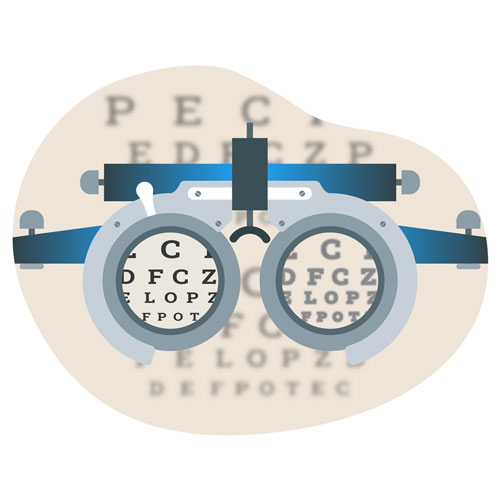
Clear vision is fundamentally crucial for your child’s success in the classroom. A regular comprehensive eye exam is essential for the early detection and treatment of vision problems.4
Uncorrected vision issues can affect your child’s ability to learn, creating struggles with reading, writing, eye fatigue and their ability to focus. While school screenings may catch obvious problems, a yearly visit to the eye doctor can help ensure nothing has been missed and promote good overall eye health.4
3. Book a Dental Appointment
Your child’s school may require a dental exam, depending on their age.5 Like adults, children should see the dentist every six months, but a back-to-school checkup is a good time for your dentist to address their overall oral health.1 Your child will likely receive a cleaning to keep tooth decay in check, and possibly X-rays to monitor how their teeth are developing.5
If your child wears a mouthguard for sports or other reasons, ask your dentist to check it for fit, wear and tear. Summer growth spurts or lost teeth may mean it’s time to refit their mouthguard.5
4. Ease Into a Consistent Sleep Schedule

If your kids stay up later during the summer, gradually ease them back into an earlier bedtime a week or two before school starts, so they’re better prepared for early school mornings.6
Create a calming bedtime routine, which might include reading time, a warm bath or tuck-ins, depending on their age.6 Establish a cut-off time one to two hours before bedtime when screens, smartphones and tablets are powered off.6 Children between the ages of 6 and 12 need nine to 12 hours of sleep, while teens need eight to 10 hours.1
5. Pack Essential Medical Supplies
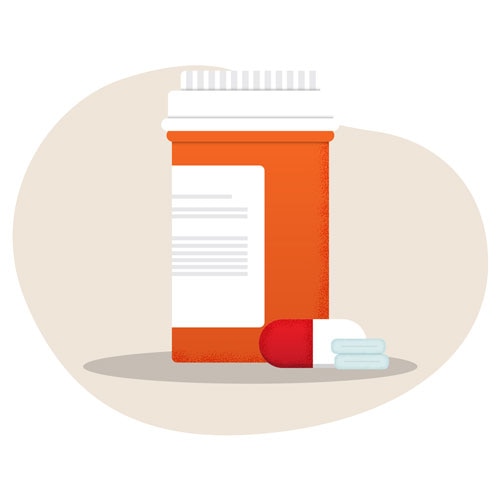
Stock your child’s backpack with supplies to help them stay safe and healthy. Include a mask, hand sanitizer, a BPA-free water bottle, sunglasses and sunscreen. Include medications your child takes, such as allergy meds or an asthma inhaler, and a current list of emergency contacts.1
If your child needs medication during the school day, make sure their prescriptions are up-to-date. Contact the school nurse about your child’s medical needs and review the school’s protocols for medication administration, as well as provide written dosing instructions for school staff.
6. Check Their Backpack Fit

A heavy backpack can cause neck, shoulder and back pain, so make sure your child's backpack never weighs more than 10% to 20% of their body weight. For example, if your child weighs 80 pounds, their backpack should not weigh more than 8 to 16 pounds.7
Choose a backpack with a padded back and wide, padded shoulder straps, and teach your children to use both straps so they don't strain their muscles. If your kids have a lot of heavy items to carry, consider giving them a rolling backpack instead.7
7. Purchase Well-Fitting Shoes
While your child may have their eye on the latest footwear fad for back-to-school shoes, take the time to get a professional fit, not just for comfort but also to protect your child’s feet from injury or developing other foot issues.8
Choose shoes made from durable materials with a reinforced toe or heel, and look for supportive insoles with the right arch support for your child’s foot type.8
When shopping, have your children wear the same type of socks they will wear with the shoes to help ensure a good fit; there should be about a thumb’s width of space between the toe of the shoe and your child’s longest toe.8 Shop for shoes later in the day (when feet are usually at their largest), and buy for the larger foot with some room to grow.
8. Practice Good Hygiene
Help your kids stay healthy this school year by reminding them to wash their hands after using the bathroom, before eating and after blowing their nose. When soap and water aren't available, hand sanitizer that contains alcohol is the next best way to kill germs. To further reduce the spread of germs, encourage kids to keep their hands away from their face and to cough or sneeze into their arm or shoulder.9
Discourage them from sharing cups, water bottles, utensils or food with friends, even if they don’t seem sick. Teach older children the importance of showering daily to remove bacteria, dirt and sweat, and how to properly apply deodorant.9
Prohibit your child from sharing combs, brushes, towels, scarves, hats or helmets to reduce their chances of contracting lice.10
9. Plan Balanced Breakfasts
A healthy breakfast can help your kids maintain focus, mood and energy levels. Kids who eat a healthy, balanced breakfast are typically more alert throughout the school day, are better behaved and are stronger academically than those who don’t.11
Emphasize lean protein (yogurt, eggs or milk), complex carbohydrates (oatmeal, whole grain pancakes, bread or cereals) and fiber (fruit), and minimize sugar and caffeine.11
For kids who skip breakfast because they aren’t typically hungry first thing in the morning, keep grab-and-go items on hand that they can eat later, such as cheese sticks, protein shakes or bars, hard-boiled eggs, trail mix, yogurt tubes, granola or fruit.11
10. Pack Healthy Lunches
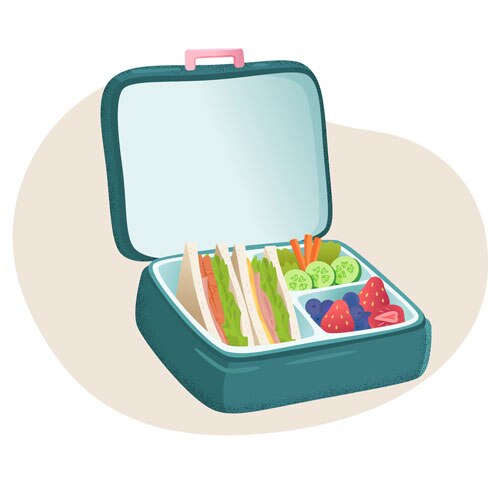
Just as a balanced breakfast helps set the tone for the school day, a healthy lunch can keep your child energized through the afternoon.
A well-balanced lunch box includes protein, fruits and vegetables, complex carbohydrates and dairy or other calcium sources. It’s ok to include a small amount of treat foods, such as a salty or sweet snack, to reinforce the idea that no food is inherently “good” or “bad.” Children learn to cultivate a positive relationship with food when they understand that all foods have a place in a balanced diet.12
11. Keep Hydration in Mind
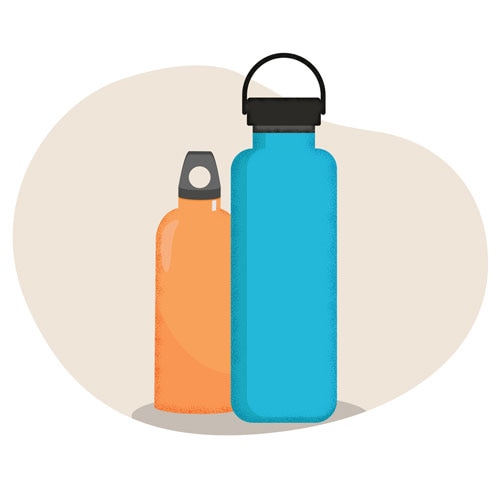
Water is one of the most important parts of your kids' diet, so it's vital that they drink it throughout the school day. Water is essential in regulating body temperature, keeping bowel movements regular and helping prevent conditions such as urinary tract infections and kidney stones.13
To help your kids stay hydrated, send them to school with a reusable BPA- and phthalate-free water bottle every day.13
Children ages 1 through 7 should drink the same number of 8-ounce cups per day as their age. For example, a 5-year-old should drink a total of 40 ounces of water daily. Children ages 8 and older should drink a minimum of eight 8-ounce cups (64 ounces) per day, and possibly more during and after physical activity.13
12. Create Morning and Evening Routines
Consistent morning and evening routines can help smooth the transition back to school and set your child up for success.14
Keep things calm and predictable in the morning by prepping clothes, lunches and backpacks the night before.14 Wake up early enough to ease into the morning, leaving enough time to eat breakfast and review the highlights of the upcoming day with your child. Younger children can benefit from a visual chart to help them with routines like getting dressed, making beds and brushing teeth.
Create an after-school routine that includes movement, homework time, screen-free quiet time and free time for socializing. Leave time for chores or other household responsibilities, and set a regular bedtime to help ensure kids get the rest they need to stay focused and energized for the next day.6
13. Discuss Feelings and Expectations
Talk with your child about any stress or fears they may have about returning to school, reassuring them that it’s normal to feel nervous at the beginning of a new school year.6
Support them by working together to come up with strategies they can use to help ease their concerns. This might include getting familiar with a new routine before the first day of school, role-playing different scenarios or practicing some deep breathing or calming exercises to use when they feel nervous or excited.6
14. Teach Coping and Stress Management Skills

Make sure your child knows your home is a safe space to talk openly about their feelings or problems without judgment, which can help them feel supported and understood.
Healthy coping and stress management skills can include simple techniques like deep breathing, learning to pause when emotions are high and meditation.14 Encourage your child to process their stress by engaging in activities they enjoy, like exercise, reading, listening to music or yoga. Regular routines, plenty of high-quality sleep and good nutrition are habits that can help build resilience.
15. Monitor Screen Time
Electronic device use can steal time from other activities, and the light from screens can disrupt sleep patterns, so limit screen time beyond schoolwork as much as possible. Make sure your kids shut down all devices at least an hour before bedtime.14 Also, keep the TV and other electronic distractions off during homework time.6 In addition, monitor your child's social media use to spot signs of bullying or other stressors.6
16. Review School Safety Procedures
Part of your back-to-school prep should include reviewing school safety procedures with your child. Cover topics like bus rules and safe street crossing.6 Also discuss when and with whom it’s ok to share their contact information and what to do in case of an emergency.15 Remind them that school guidelines are there to keep students safe and to speak up if something doesn’t feel right.15
Some school emergency response procedures may include protocols for evacuation, relocation, lockdown, lockout or shelter-in-place. Explain how students might practice these procedures at school using age-appropriate terms. Keep the conversation calm to build their confidence and awareness without creating unnecessary fear.15
17. Sign Up for Extracurricular Activities
Extracurricular activities are a great way for kids to explore their interests, build skills and make friends outside the classroom. As the school year begins, talk with your child about clubs, sports, music or art programs they might want to try. Encourage a balance between activities and schoolwork, which includes downtime for rest. But beware of overscheduling — make sure your child is excited, not overwhelmed, by their schedule. The right activities can boost your child’s confidence, reduce stress and make their school experience more rewarding.
Remember that some activities, like sports or scouts, may require a pre-participation physical to determine if they’re healthy enough to participate in a certain sport or activity.1 An activity physical is particularly important for kids with an existing health condition, such as asthma, diabetes, a heart condition or prior injuries.
18. Get Moving at Home
Include physical activity each day to help your kids sleep better, manage stress and enjoy better overall health.14 Look for activities that suit their interests, such as hiking, biking, playing in the backyard, sports, practicing yoga or walking the dog. Chores like yard work, unloading groceries and laundry will get them moving as well.
19. Purchase and Organize School Supplies
Reduce last-minute stress and support your kids’ feeling of preparedness by having them organize their school supplies in advance. Enlist your child’s help in designating a place to work on homework and keep their study materials.6 Deciding how to organize and decorate their space creates a sense of ownership, teaches organization skills and promotes time management and efficiency.
Don’t forget your child’s closet. Keep the momentum going by sorting through your child’s school clothes, setting aside what no longer fits and making a list of what needs to be replaced.
20. Set Learning Goals
Your child’s teacher undoubtedly has goals for their students, but ask your child what their goals for the school year are.
Their goals may be academic- or grade-based, or they could include improving a physical skill, exploring an interest in art or music or learning a new hobby. Help them develop a plan for achieving their goals, and talk about how and when they can ask for help should they need it.
Prepared, Positive and Ready to Go
Preparing for a new school year is more than school supplies, forms and checklists. It’s about creating an environment that supports your child’s physical, emotional and mental well-being. Consistent routines that promote good nutrition and sleep habits, daily movement, regular downtime, stress management and open communication are the building blocks of a successful school year.
Managing Health and Wellness Costs With the CareCredit Credit Card
If you are looking for an option to help manage your health and wellness costs, consider financing with the CareCredit credit card. The CareCredit credit card can help you pay for the care you want and need and make payments easy to manage.* Use our Acceptance Locator to find a provider near you that accepts CareCredit. Continue your wellness journey by downloading the CareCredit Mobile App to manage your account, find a provider on the go and easily access the Well U blog for more great articles, podcasts and videos.
Your CareCredit credit card can be used in so many ways within the CareCredit network including vision, dentistry, cosmetic, pet care, hearing, health systems, dermatology, pharmacy purchases and spa treatments. How will you invest in your health and wellness next?
Author Bio
Anne-Marie Kennedy is a freelance writer with more than 20 years of experience covering health and wellness, personal finance and real estate/investing.







